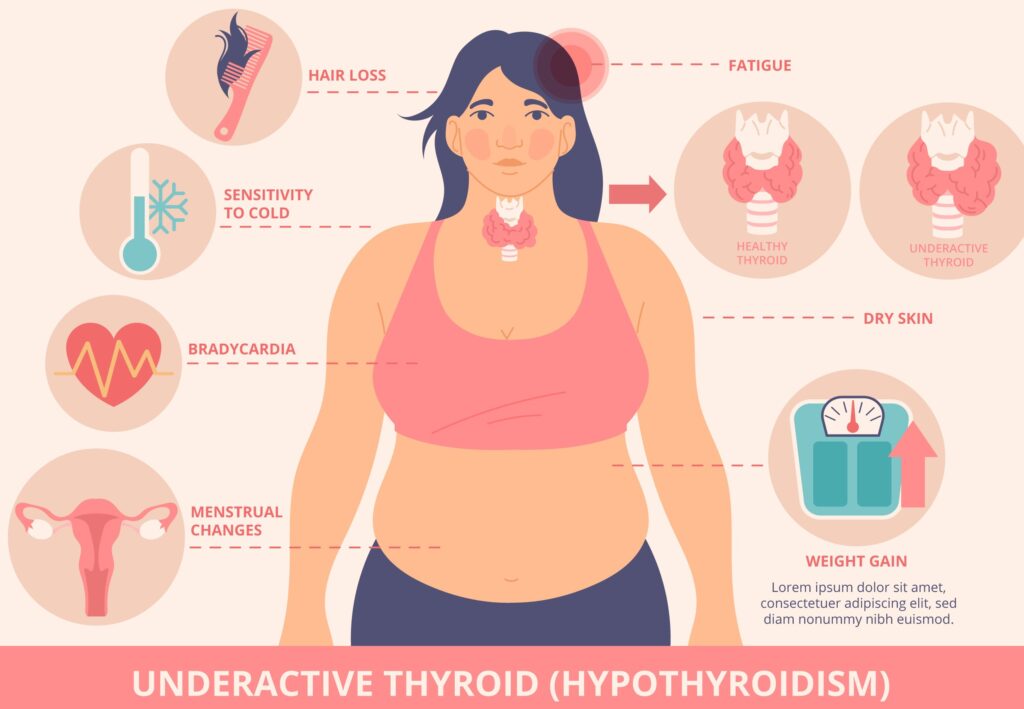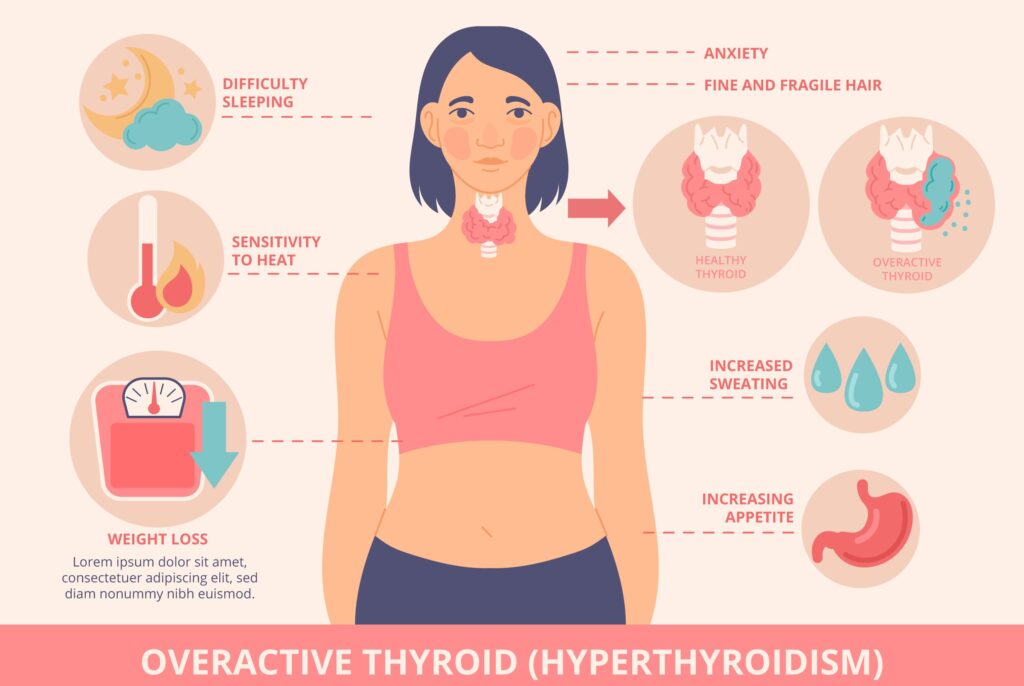The thyroid might be small, but it plays a major role in regulating your body’s metabolism, energy, and even mood. If it’s not functioning properly, your overall health can take a serious hit. In this article, we’ll break down the basics of thyroid health, the most common disorders, symptoms to watch out for, treatment options, and some wellness tips to keep your thyroid in check. Plus, we’ll explore how Elle Health & Wellness can support your journey toward better thyroid and overall well-being.
What Does the Thyroid Do?
Located at the base of your neck, the thyroid is a butterfly-shaped gland responsible for producing hormones that regulate several essential functions in your body. Specifically, the thyroid produces thyroxine (T4) and triiodothyronine (T3), which influence metabolism, heart rate, body temperature, and even digestion.
When the thyroid produces too little or too much of these hormones, it can lead to significant health issues. Understanding the symptoms is the first step in taking control of your thyroid health.
Common Thyroid Disorders
There are two main thyroid conditions that people commonly face: hypothyroidism and hyperthyroidism. Let’s take a closer look at each:
Hypothyroidism (Underactive Thyroid)

In hypothyroidism, your thyroid doesn’t produce enough thyroid hormone. This can slow down many bodily functions and may cause the following symptoms:
- Fatigue
- Weight gain
- Sensitivity to cold
- Dry skin and hair
- Depression
- Constipation
- Muscle weakness
Common Causes:
- Hashimoto’s thyroiditis: An autoimmune disorder where your immune system attacks your thyroid.
- Iodine deficiency: Rare in countries where iodine is added to salt but can be a concern in some regions.
- Thyroid surgery or radiation therapy: Used to treat other thyroid issues but can lead to hypothyroidism.
Hyperthyroidism (Overactive Thyroid)

On the flip side, hyperthyroidism occurs when your thyroid produces too much hormone, leading to the speeding up of many processes in the body. Symptoms include:
- Unexplained weight loss
- Rapid or irregular heartbeat
- Nervousness or irritability
- Tremors
- Excessive sweating
- Insomnia
- Heat intolerance
Common Causes:
- Graves’ disease: Another autoimmune disorder that overstimulates the thyroid.
- Thyroid nodules: Overgrowths in the thyroid can increase hormone production.
- Excessive iodine: Too much iodine can trigger hyperthyroidism in some people.
Both hypothyroidism and hyperthyroidism can have significant effects on your daily life, but the good news is, they’re manageable with the right treatment and lifestyle changes.
Diagnosing Thyroid Issues
If you’re experiencing any of the above symptoms, it’s important to talk to a healthcare professional. Typically, a simple blood test measuring levels of Thyroid-Stimulating Hormone (TSH), T3, and T4 can give insight into whether your thyroid is underactive or overactive. Additional tests like ultrasounds or biopsies may be used to check for thyroid nodules or more complex issues.
At Elle Health & Wellness, we encourage clients to stay on top of their health by regularly consulting with professionals, especially if there’s a family history of thyroid problems.
Treatment Options for Thyroid Disorders

The treatment for thyroid disorders depends on whether your thyroid is underactive or overactive. Here’s a look at the most common treatments:
For Hypothyroidism
The standard treatment for hypothyroidism is levothyroxine, a synthetic thyroid hormone that replaces the deficient hormone your thyroid isn’t producing. It’s usually a lifelong treatment, but it’s effective in restoring normal thyroid function.
Patients taking levothyroxine need to monitor their TSH levels regularly to ensure the medication is working correctly.
For Hyperthyroidism
Treating hyperthyroidism usually involves one or more of the following options:
- Anti-thyroid medications: Drugs like methimazole or propylthiouracil help reduce the amount of thyroid hormone your gland produces.
- Radioactive iodine treatment: This therapy shrinks the thyroid gland by targeting it with radioactive iodine, effectively reducing hormone production.
- Surgery: In severe cases, part or all of the thyroid gland may be surgically removed (thyroidectomy).
Like hypothyroidism, treatment for hyperthyroidism requires ongoing management. Once the thyroid is stabilized, lifestyle changes can go a long way in improving overall health and well-being.
Wellness Tips for Maintaining Thyroid Health
While medication is often necessary for managing thyroid disorders, incorporating these wellness tips into your lifestyle can help support thyroid function and improve your quality of life:
1. Focus on a Balanced Diet
Eating a well-rounded diet rich in essential nutrients like iodine, selenium, and zinc can help keep your thyroid healthy. Foods like fish, eggs, dairy, nuts, and whole grains provide nutrients that support optimal thyroid function. However, it’s important not to consume too much iodine, which can aggravate certain thyroid conditions. Always consult with a healthcare provider or nutritionist if you have specific dietary concerns.
2. Stay Physically Active
Exercise can help combat some of the symptoms associated with thyroid imbalances, such as weight gain, fatigue, and depression. Aim for moderate activity like walking, yoga, or swimming to keep your metabolism active and improve your mood. Plus, regular movement helps maintain healthy energy levels, which is especially important for those with hypothyroidism.
3. Manage Stress
Chronic stress can wreak havoc on your thyroid by disrupting hormone production. Incorporating stress management techniques like meditation, deep breathing, or even hobbies you enjoy can help keep your thyroid in check.
4. Prioritize Sleep
A consistent sleep schedule can do wonders for hormone regulation, including your thyroid function. Try to get at least 7-9 hours of sleep each night to help your body repair and recharge.
When to Seek Help
If you’re experiencing any persistent symptoms of thyroid dysfunction, it’s important to seek help sooner rather than later. Early diagnosis and treatment can prevent long-term health complications. Elle Health & Wellness can provide personalized guidance, whether you need help understanding your symptoms, managing medication, or incorporating wellness strategies into your routine.
Wrapping It Up
Understanding thyroid health is key to managing both your physical and mental well-being. By recognizing the symptoms, seeking appropriate treatment, and embracing healthy lifestyle habits, you can take control of your thyroid health. Whether you’re looking for guidance on managing your thyroid condition or seeking a more holistic approach, Elle Health & Wellness is here to help you along the way.





